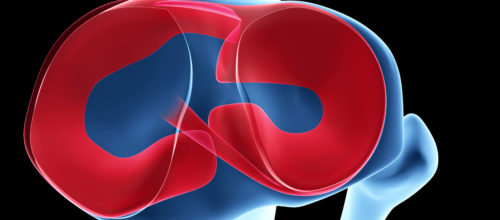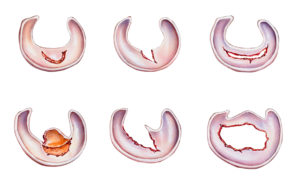
Meniscal Tears
Meniscal tears are among the most common knee injuries. Athletes, particularly those who play contact sports, are at risk for meniscal tears. However, anyone at any age can tear a meniscus. When people talk about torn cartilage in the knee, they are usually referring to a torn meniscus.
Three bones meet to form your knee joint: your femur, tibia, and patella. Two wedge-shaped pieces of cartilage act as “shock absorbers” between your thigh bone and shin bone. These are the medial and lateral meniscus. They are tough and rubbery structures that help cushion the joint and keep it stable.
Menisci tear in different ways. Tears are classified by how they look, as well as where the tear occurs in the meniscus. Common tears include bucket handle, flap, and radial.
Sports-related meniscal tears often occur along with other knee injuries, such as ACL tears. Players may squat and twist the knee, causing a tear. Direct contact, like a tackle, is also sometimes involved.
Older people are more likely to have degenerative meniscus tears. Cartilage weakens and wears thin over time. Aged, worn tissue is more prone to tears. Just an awkward twist when getting up from a chair may be enough to cause a tear, if the menisci have weakened with age.
Symptoms
You might feel a “pop” when you tear a meniscus. Most people can still walk on their injured knee and many athletes keep playing with a tear. Over 2 to 3 days, your knee will gradually become more stiff and swollen.
The most common symptoms of meniscal tears are:
- Pain
- Stiffness and swelling
- Catching or locking of your knee
- The sensation of your knee “giving way”
- You are not able to move your knee through its full range of motion
Without treatment, a piece of meniscus may come loose and drift into the joint. This can cause your knee to slip, pop, or lock.
Meniscal tears can be treated conservatively with physical therapy, but more severe tears may require surgical intervention. If you have been diagnosed with a meniscal tear or have been experiencing any of the above symptoms, reach out to one of our physical therapists today!

